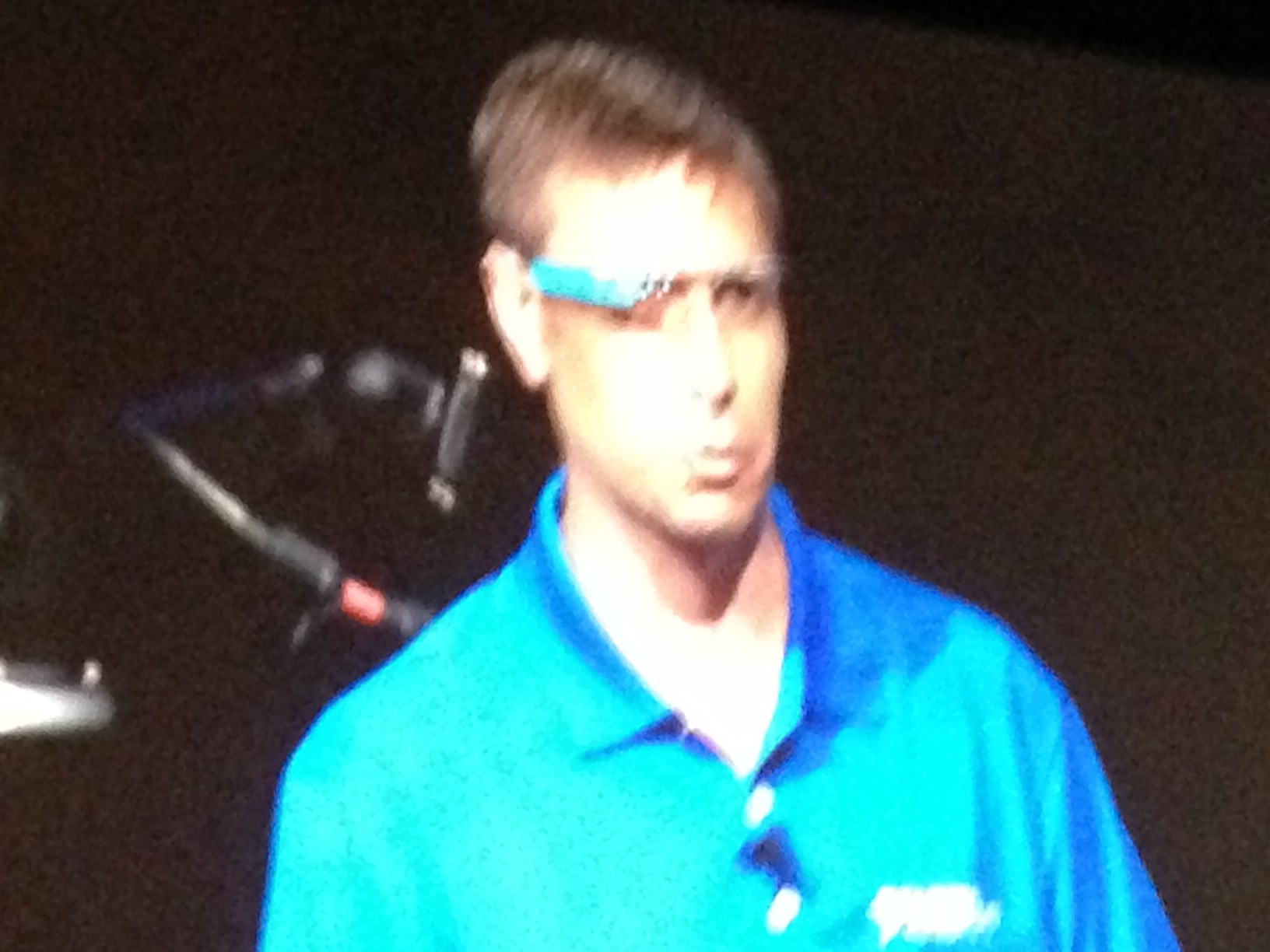
NI Unveils New Products and Glimpses of Future for Automation, Test and Measurement
The second part of the NI Week Day 1 keynote is devoted to showing off the latest products–usually to great fanfare and much applause. Eric Starkloff SVP Marketing hosted the keynote and began by acknowledging the nearly 4,000 attendees had set an NI Week attendance record. He also introduced the themes of what Wired Magazine called “the programmable world” and NI’s “Platform-based Design.”
I could not capture a better picture, but here is Starkloff modeling Google Glass during a demo that showed a potential application for this new technology.
Perhaps the most significant detail buried in the descriptions below concerns NI’s use of Linux real-time, an open source operating system, as the OS for the new line of Compact RIO. I talked with a user this morning who pointed to that as significant, but puzzling. I bet that this addition will open up the platform for even greater innovation by developers.
NI continues to push the envelop of technology to enable its customers to solve more automation and test & measurement problems.
Product Highlights
LabVIEW 2013 helps users focus on innovation instead of infrastructure. Highlights of the latest release–which is ready for download–include:
• Support for the latest evolution of the NI CompactRIO platform, the NI cRIO-9068 software-designed controller, which runs the NI Linux Real-Time operating system
• New tools facilitate the management, documentation and debugging of increasingly complex systems
• Streamlined deployment of large systems through improved web services and NI LabVIEW Application Builder
NI cDAQ-9188XT, an 8-slot NI CompactDAQ Ethernet chassis designed for distributed or remote measurements in extreme environments. The cDAQ-9188XT can withstand temperatures from -40 to 70 °C, 50 g of shock and 5 g of vibration. Engineers in the automotive, military and aerospace industries have used it to successfully acquire data and avoid costly repeat tests.
In addition, the chassis is the first in the NI CompactDAQ platform to offer an onboard watchdog with defined safe states to help protect your tests and equipment. The platform includes 10 chassis options, three buses and over 50 C Series modules with a wide range of connectivity and I/O. The platform also has native integration with NI LabVIEW system design software, which provides signal processing libraries and user interface controls designed for data visualization.
The new cRIO-9068 controller features:
• Four times faster performance than previous generations, powered by a 667 MHz dual-core ARM Cortex-A9 processor and Xilinx Artix-7 FPGA
• New Linux-based, real-time OS that provides greater flexibility for both LabVIEW Real-Time and C/C++ application developers
• Extended operating temperature range of -40 °C to 70 °C
• Consistent LabVIEW programming experience that ensures both new and existing designs take full advantage of updated technology with minimal effort
Several additions to its NI LabVIEW reconfigurable I/O (RIO) architecture, increasing user flexibility and power to meet modern automated test system challenges and reduce the total cost of test.
The most significant platform updates are new instrument driver FPGA extensions, a feature of the NI RF signal analyzer and RF signal generator instrument drivers that combine the flexibility of the open FPGA with the compatibility engineers expect from an industry-standard instrument driver. FPGA extensions build on the release of the world’s first software-designed instrument, the NI PXIe-5644R vector signal transceiver announced at
NIWeek 2012. The extensions make it even easier for those with little to no FPGA programming experience to access the benefits of an open FPGA to better meet application demands with additional processing and control.
Engineers already using vector signal transceivers can upgrade their drivers then mix application-specific FPGA code with standard instrument driver code.






